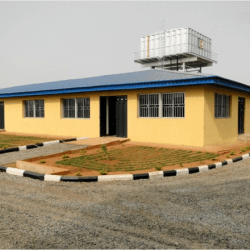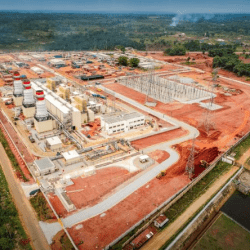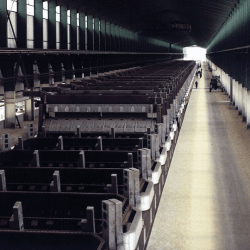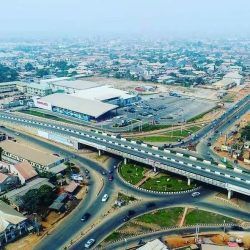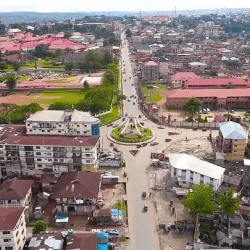In 1973, Julius Berger embarked on an industrial venture that would redefine the Nigerian automotive industry and mark a new chapter in the nation’s journey towards economic independence. As the company took on the Volkswagen assembly plant’s construction, it introduced a blueprint for local industrial contracting that would leave an indelible mark on Nigeria’s economy and infrastructure.
The Volkswagen assembly plant, a turnkey project based in Lagos, was not only Julius Berger’s first industrial contract but also a significant milestone in African industrial construction. The facility was pivotal in producing the first “Made in Nigeria” Volkswagen Beetle, a vehicle that would become an emblem of progress and national pride. This article delves into the historical, economic, and cultural significance of Julius Berger’s project, exploring how this endeavor laid the foundation for the automotive industry’s growth in Nigeria.

Background of Julius Berger’s Entry into Industrial Contracting
Julius Berger, founded as a construction company, initially focused on civil engineering and infrastructure projects, specializing in large-scale developments. However, in the early 1970s, Nigeria’s burgeoning economy and emphasis on industrial self-reliance inspired the company to diversify its services. Recognizing the nation’s drive for localized manufacturing, Julius Berger saw an opportunity to establish itself in industrial contracting by aligning with international manufacturers like Volkswagen. This strategic move into industrial construction began with the Volkswagen assembly plant project, representing a pivot from the company’s traditional focus to a new era of industry-driven construction projects.
Overview of the Nigerian Automotive Sector Pre-1973
Prior to the Volkswagen assembly plant, Nigeria’s automotive sector was primarily dominated by imported vehicles, with limited infrastructure for local manufacturing. Nigeria was then largely reliant on foreign-made cars, which led to high costs for consumers due to import duties and shipping expenses. The lack of locally produced vehicles also limited job creation and technical skill development within Nigeria. The government, eager to reduce dependence on imports, identified local manufacturing as a critical sector for development, and the Volkswagen assembly plant became a focal point for these ambitions.
Nigeria’s Economic Development and Industrial Aspirations
The Nigerian government’s drive to diversify the economy led to policies supporting domestic industrial projects, from manufacturing to transportation infrastructure. Oil wealth had provided Nigeria with substantial capital, allowing for investments in industries that would facilitate economic independence. As part of its vision for modernization, the government prioritized automobile production, recognizing the social and economic benefits of a self-sufficient automotive industry.
Demand for Automotive Solutions in Nigeria
As Nigeria’s urban population grew, so did the demand for reliable, locally produced transportation options. The establishment of an automotive manufacturing facility promised to fulfill this demand, providing Nigerians with more affordable vehicles and reducing the country’s dependence on imported goods. This demand helped solidify Julius Berger’s decision to partner with Volkswagen in a groundbreaking project that would make affordable, “Made in Nigeria” cars a reality.
Julius Berger and Volkswagen Partnership: The Beginning of a New Era
Julius Berger’s partnership with Volkswagen in 1973 was a defining moment for both entities. The Volkswagen Group saw Nigeria as a promising market with immense growth potential and sought a trusted partner with extensive knowledge of Nigerian infrastructure and project management. Julius Berger’s expertise in handling large-scale projects and understanding of the local landscape made it an ideal partner for Volkswagen, paving the way for a successful collaboration.
Planning and Design of the Volkswagen Assembly Plant
The project involved meticulous planning, as the assembly plant would need to adhere to Volkswagen’s high standards while meeting the logistical and operational challenges unique to Nigeria. Julius Berger adopted an advanced approach, using a turnkey model where the company managed all aspects of construction, including planning, material procurement, and final assembly, ensuring the project was delivered on time and ready for immediate use.
Turnkey Project Delivery in the 1970s: An Innovative Approach
At a time when most construction projects were managed through segmented phases, the turnkey model adopted by Julius Berger represented a significant innovation. This approach allowed Volkswagen to rely on a single entity for the entire project lifecycle, from design to execution. For Nigeria, it set a new standard for industrial construction, showing how efficiency and speed could be maximized while maintaining quality, which would inspire future industrial ventures in the country.
Significance of the Volkswagen Assembly Plant in Lagos
The Volkswagen assembly plant in Lagos became more than just a production facility; it symbolized Nigeria’s aspiration for industrial advancement and economic self-sufficiency. Situated in Lagos, Nigeria’s commercial capital, the plant’s location was strategic, offering easy access to a bustling market and established infrastructure, such as ports and road networks, which facilitated the efficient transportation of materials and finished vehicles.
Location Choice and Strategic Importance of Lagos
Lagos was selected for its accessibility, vibrant economy, and connectivity to major trade routes, making it an ideal location for such an ambitious project. As one of Nigeria’s most populous cities, Lagos also provided a large workforce, which was essential for the labor-intensive demands of the assembly plant.
Impact on Local Employment and Skill Development
The Volkswagen assembly plant contributed significantly to job creation, offering both direct and indirect employment opportunities to thousands of Nigerians. It also facilitated skill development, as local workers were trained in modern manufacturing techniques, assembly line operations, and technical maintenance, fostering a skilled labor force that would benefit Nigeria’s industrial growth for decades to come.
The First “Made in Nigeria” Beetle: A Symbol of National Pride
The production of the first “Made in Nigeria” Volkswagen Beetle was a monumental achievement, symbolizing Nigeria’s entry into the realm of automotive manufacturing. The Beetle, already an iconic car worldwide, now held a special place in the hearts of Nigerians as it represented the potential of home-grown production and the capability of Nigerian industries to deliver quality products. This first Nigerian-assembled Beetle quickly became a symbol of pride and served as an inspiration for subsequent generations.
Legacy of the First Beetle Produced Locally
This iconic vehicle became a popular choice among Nigerians, reflecting both the pride of local ownership and support for the national industry. The success of the “Made in Nigeria” Beetle inspired further automotive development in the country and increased consumer trust in locally produced goods.
Influence on Nigeria’s Growing Automotive Market
The successful production of the Beetle signified that Nigeria could sustain a competitive automotive market, encouraging other automakers to consider similar ventures in Nigeria. This local production helped boost the economy, reduced vehicle import costs, and promoted the idea of supporting domestic manufacturing.
Long-Term Effects on Nigeria’s Industrial Landscape
The Volkswagen project was a turning point in Nigeria’s industrial development, setting the stage for the country’s future industrial infrastructure. The success of this project demonstrated that Nigeria had the capacity to handle large-scale industrial manufacturing, encouraging both local and foreign investors to explore opportunities within Nigeria’s borders.
Paving the Way for Future Automotive Ventures in Nigeria
The plant’s establishment was a stepping stone for future automotive companies to invest in Nigeria, as it provided a working model of success. This venture prompted discussions on favorable industrial policies, tax incentives, and infrastructure investments, all of which were necessary to support a thriving automotive industry.
Broader Economic Impacts on Nigerian Industry
The economic impact of the Volkswagen plant extended beyond the automotive sector, contributing to Nigeria’s GDP and boosting local suppliers who provided raw materials and services. It also had a ripple effect, influencing policies aimed at creating a more supportive environment for industrial ventures across various sectors.
Julius Berger’s Evolution Post-Volkswagen Project
Following the Volkswagen project, Julius Berger expanded its operations, becoming a central player in Nigeria’s construction and infrastructure development. This pivotal project helped the company build a reputation for reliability and quality, cementing its position as a leader in the Nigerian construction industry.
Diversification into Other Sectors
Julius Berger’s successful completion of the Volkswagen plant encouraged the company to explore opportunities beyond industrial construction. Today, Julius Berger is involved in a range of sectors, including commercial, residential, and infrastructure projects across Nigeria.
Legacy in Infrastructure Development Across Nigeria
The company’s influence grew as it became instrumental in developing Nigeria’s essential infrastructure, from roads and bridges to buildings and energy facilities. The legacy of the Volkswagen project has remained a testament to the company’s capabilities and set a high standard for industrial projects in the region.
Reflection on Nigeria’s Automotive Legacy and Julius Berger’s Role
Reflecting on this historical project, it is clear that the Volkswagen assembly plant was more than just an automotive facility; it was a milestone that showcased the potential for industrial independence. Julius Berger’s role in this project was fundamental, demonstrating that local partnerships could bring advanced manufacturing capabilities to Nigeria, fostering pride, economic growth, and national identity.




